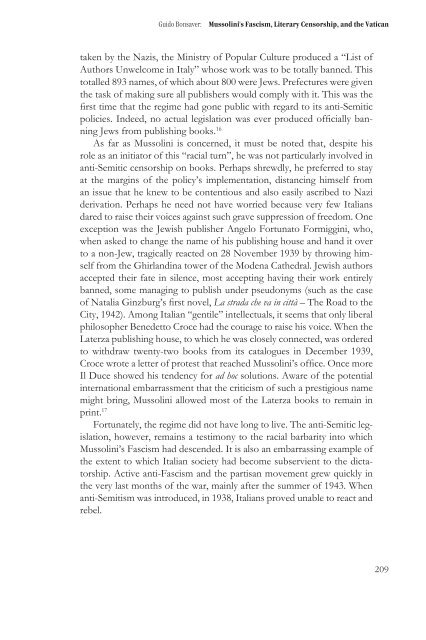Literatura in cenzura - Društvo za primerjalno književnost - ZRC SAZU
Literatura in cenzura - Društvo za primerjalno književnost - ZRC SAZU
Literatura in cenzura - Društvo za primerjalno književnost - ZRC SAZU
- No tags were found...
Create successful ePaper yourself
Turn your PDF publications into a flip-book with our unique Google optimized e-Paper software.
Guido Bonsaver:Mussol<strong>in</strong>i's Fascism, Literary Censorship, and the Vaticantaken by the Nazis, the M<strong>in</strong>istry of Popular Culture produced a “List ofAuthors Unwelcome <strong>in</strong> Italy” whose work was to be totally banned. Thistotalled 893 names, of which about 800 were Jews. Prefectures were giventhe task of mak<strong>in</strong>g sure all publishers would comply with it. This was thefirst time that the regime had gone public with regard to its anti-Semiticpolicies. Indeed, no actual legislation was ever produced officially bann<strong>in</strong>gJews from publish<strong>in</strong>g books. 16As far as Mussol<strong>in</strong>i is concerned, it must be noted that, despite hisrole as an <strong>in</strong>itiator of this “racial turn”, he was not particularly <strong>in</strong>volved <strong>in</strong>anti-Semitic censorship on books. Perhaps shrewdly, he preferred to stayat the marg<strong>in</strong>s of the policy’s implementation, distanc<strong>in</strong>g himself froman issue that he knew to be contentious and also easily ascribed to Naziderivation. Perhaps he need not have worried because very few Italiansdared to raise their voices aga<strong>in</strong>st such grave suppression of freedom. Oneexception was the Jewish publisher Angelo Fortunato Formigg<strong>in</strong>i, who,when asked to change the name of his publish<strong>in</strong>g house and hand it overto a non-Jew, tragically reacted on 28 November 1939 by throw<strong>in</strong>g himselffrom the Ghirland<strong>in</strong>a tower of the Modena Cathedral. Jewish authorsaccepted their fate <strong>in</strong> silence, most accept<strong>in</strong>g hav<strong>in</strong>g their work entirelybanned, some manag<strong>in</strong>g to publish under pseudonyms (such as the caseof Natalia G<strong>in</strong>zburg’s first novel, La strada che va <strong>in</strong> città – The Road to theCity, 1942). Among Italian “gentile” <strong>in</strong>tellectuals, it seems that only liberalphilosopher Benedetto Croce had the courage to raise his voice. When theLater<strong>za</strong> publish<strong>in</strong>g house, to which he was closely connected, was orderedto withdraw twenty-two books from its catalogues <strong>in</strong> December 1939,Croce wrote a letter of protest that reached Mussol<strong>in</strong>i’s office. Once moreIl Duce showed his tendency for ad hoc solutions. Aware of the potential<strong>in</strong>ternational embarrassment that the criticism of such a prestigious namemight br<strong>in</strong>g, Mussol<strong>in</strong>i allowed most of the Later<strong>za</strong> books to rema<strong>in</strong> <strong>in</strong>pr<strong>in</strong>t. 17Fortunately, the regime did not have long to live. The anti-Semitic legislation,however, rema<strong>in</strong>s a testimony to the racial barbarity <strong>in</strong>to whichMussol<strong>in</strong>i’s Fascism had descended. It is also an embarrass<strong>in</strong>g example ofthe extent to which Italian society had become subservient to the dictatorship.Active anti-Fascism and the partisan movement grew quickly <strong>in</strong>the very last months of the war, ma<strong>in</strong>ly after the summer of 1943. Whenanti-Semitism was <strong>in</strong>troduced, <strong>in</strong> 1938, Italians proved unable to react andrebel.209
















